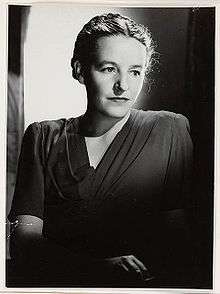Dymphna Cusack

Ellen Dymphna Cusack AM (21 September 1902 – 19 October 1981) was an Australian author and playwright.[1]
Personal life
Born in Wyalong, New South Wales, Cusack was educated at Saint Ursula's College, Kingsgrove,[2] and graduated from the University of Sydney with an honours degree in Arts and a diploma in Education. She worked as a teacher until she retired in 1944 for health reasons. Her illness was confirmed in 1978 as multiple sclerosis.[1]
Career
Cusack wrote twelve novels (two of which were collaborations), seven plays,[3] three travel books, two children's books and one non-fiction book. Her collaborative novels were Pioneers on Parade (1939) with Miles Franklin, and Come In Spinner (1951) with Florence James.[4]
The play Red Sky at Morning was filmed in 1944, starring Peter Finch.[5] The biography Caddie, the Story of a Barmaid, to which Cusack wrote an introduction and helped the author write, was produced as the film Caddie in 1976. The novel Come In Spinner was produced as a television series by the Australian Broadcasting Corporation in 1989, and broadcast in March 1990.[6]
Family
Her younger brother, John, was also an author, writing the war novel They Hosed Them Out under the pseudonym John Beede, which was first published in 1965, republished in 2012.[7]
Activism
Cusack advocated social reform and described the need for reform in her writings. She contributed to the world peace movement during the Cold War era as an antinuclear activist.[1] She and her husband Norman Freehill were members of the Communist Party and they left their entire estates to the Party in their wills.[8]
Contribution and recognition
Cusack was a foundation member of the Australian Society of Authors in 1963. She had refused an Order of the British Empire,[1] but was made a Member of the Order of Australia in 1981 for her contribution to Australian literature.[9]
Cusack was instrumental in promoting the democratic, progressive traditions of her much loved country, both as a sought-after celebrity speaker in Australia as well as a cultural commentator during her long stays in Europe from the 1940s to the 1970s.
In 2011, Cusack was one of 11 authors, including Elizabeth Jolley and Manning Clark, to be permanently recognised by the addition of brass plaques at the Writers' Walk, Sydney.[10]
Plays
- Safety First, 1927
- Shallow Cups, 1933
- Anniversary, 1935
- Red Sky at Morning, performed 1935; published 1942
- Morning Sacrifice, 1943
- Comets Soon Pass, 1943
- Call Up Your Ghosts, with Miles Franklin, 1945
- Pacific Paradise, 1955
Novels
- Jungfrau (1936)
- Pioneers on Parade (1939) with Miles Franklin
- Come In Spinner (1951) with Florence James
- Say No to Death (1951)
- Southern Steel (1953)
- Caddie, the Story of a Barmaid (1953) [Introduction only]
- The Sun in Exile (1955)
- Heatwave in Berlin (1961)
- Picnic Races (1962)
- Black Lightning (1964)
- The Sun is Not Enough (1967)
- The Half-Burnt Tree (1969)
- A Bough in Hell (1971)
Notes
- 1 2 3 4 Marilla North (2007), "Cusack, Ellen Dymphna (Nell) (1902–1981)", Australian Dictionary of Biography, National Centre of Biography, Australian National University, retrieved 18 May 2015
- ↑ Profile, middlemiss.org; retrieved 22 March 2008.
- ↑ "Plays by Dymphna Cusack". The Playwrights Database. Retrieved 9 March 2008.
- ↑ Spender (1988) p. 219
- ↑ "Red Sky at Morning (1944)". ImDb. Retrieved 9 March 2008.
- ↑ IMDB - Come in Spinner (1990)
- ↑ Cusack, J.B. (2012), They Hosed Them Out, Wakefield Press, ISBN 9781743051061
- ↑ Peter Coleman, "Memento Moscow", Weekend Australian, 16–17 January 1999, Review, p. 10
- ↑ "It's an Honour – 26 January 1981". Australian Government. Retrieved 9 March 2008.
- ↑ "Tribute to Literary Greats on Sydney Writers’ Walk", 24 October 2011; retrieved 10 April 2012.
References
- Dymphna Cusack bibliography
- Spender, Dale (1988) Writing a New World: Two Centuries of Australian Women Writers, London: Pandora
- Peitzker, Tania (2000). "Dymphna Cusack (1902–1981): a Feminist Analysis of Gender in her Romantic Realistic Texts". Potsdam: Uni Potsdam. Archived from the original on 22 May 2011. Retrieved 27 June 2008.